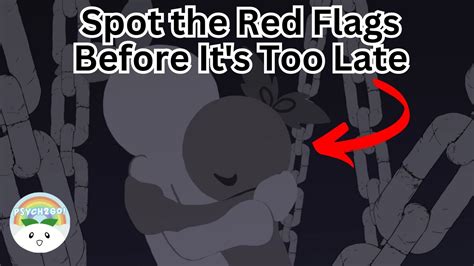
Seemingly romantic gestures can often mask controlling and manipulative behaviors, with a recent online discussion highlighting 19 specific red flags to watch out for in relationships. From excessive gift-giving to isolating partners from friends and family, these actions, though often portrayed as signs of affection, can indicate underlying issues of power and control.
The discussion, sparked on social media, centered around identifying behaviors frequently romanticized but are, in reality, warning signs. These red flags don’t necessarily indicate malicious intent but often point to unhealthy relationship dynamics and potential for future issues. Recognizing these behaviors early can help individuals make informed decisions about their relationships and prioritize their well-being.
One of the most frequently mentioned red flags is “love bombing,” characterized by excessive attention, affection, and gifts early in the relationship. While initial displays of interest are normal, love bombing involves an overwhelming and often insincere outpouring intended to manipulate and gain control. As one contributor to the online discussion noted, “It’s like they’re trying to create a dependency from the get-go.” This tactic aims to create a sense of obligation and indebtedness, making it harder for the recipient to set boundaries or leave the relationship later on.
Another significant red flag is isolating a partner from their friends and family. This behavior, often disguised as wanting to spend more quality time together, is a form of control. By cutting off a person’s support system, the abuser can increase their influence and make it more difficult for the victim to seek help or gain perspective. “They start by suggesting you don’t need your friends as much, then subtly create conflict to drive a wedge between you and your loved ones,” explained one participant in the online forum. This isolation can lead to increased emotional dependence and vulnerability.
Constant communication and monitoring were also identified as major red flags. While checking in with a partner is normal, excessive texting, calls, or demands for constant updates on their whereabouts can be a sign of insecurity and control. “It’s not about genuine concern; it’s about knowing where you are and what you’re doing at all times,” one commentator emphasized. This behavior can erode trust and create a feeling of being suffocated in the relationship.
Jealousy and possessiveness, often romanticized in media, are also significant warning signs. Unhealthy jealousy can manifest as accusations of infidelity, controlling who a partner interacts with, and monitoring their social media activity. “They might say it’s because they love you so much, but it’s really about their own insecurities and desire to control you,” one individual shared. Such behavior creates a climate of fear and distrust, undermining the foundation of a healthy relationship.
Controlling finances is another red flag that can indicate an imbalance of power. This can involve limiting a partner’s access to money, demanding to know how they spend their earnings, or making all financial decisions without their input. “Money is a huge source of control, and if your partner is trying to dictate your spending habits, it’s a major warning sign,” a participant noted. Financial control can create dependency and make it difficult for the victim to leave the relationship.
Gaslighting, a form of manipulation where the abuser makes the victim question their own sanity, is a particularly insidious red flag. This can involve denying events that happened, distorting the victim’s perception of reality, and accusing them of being overly sensitive or irrational. “Gaslighting is incredibly damaging because it erodes your self-trust and makes you doubt your own experiences,” one person explained. Over time, gaslighting can lead to anxiety, depression, and a loss of self-esteem.
Another alarming behavior is consistently blaming the victim for problems in the relationship. This can involve shifting responsibility for the abuser’s actions onto the victim, making them feel responsible for the abuser’s happiness, or blaming them for the abuser’s anger or jealousy. “It’s never their fault; it’s always something you did or didn’t do,” one commenter shared. This blame-shifting can create a cycle of guilt and self-doubt, making it difficult for the victim to recognize the abuse.
Demanding constant reassurance is also a red flag, especially when it becomes excessive and draining. While needing occasional reassurance is normal, constantly requiring a partner to validate their worth or prove their love can be a sign of insecurity and emotional dependency. “It’s exhausting to constantly have to reassure someone, and it puts a huge burden on the relationship,” one individual noted. This behavior can be emotionally draining and ultimately unsustainable.
Dismissing a partner’s feelings is another sign of disrespect and emotional unavailability. This can involve minimizing their emotions, telling them they’re overreacting, or refusing to acknowledge their feelings. “It’s like your feelings don’t matter, and they’re not willing to validate your experience,” one person shared. This dismissal can lead to feelings of invalidation and isolation.
Furthermore, monitoring a partner’s location through tracking apps or demanding access to their devices is a significant violation of privacy and a sign of control. This behavior indicates a lack of trust and a desire to exert dominance over the partner. “It’s a complete invasion of privacy and shows a deep-seated lack of respect,” one commenter emphasized. Such monitoring can create a feeling of being constantly watched and controlled.
Pressuring a partner into sexual activity is a clear violation of consent and a major red flag. This can involve guilt-tripping, manipulation, or coercion to engage in sexual acts that the partner is not comfortable with. “Consent should always be freely given and enthusiastic, and any pressure is a violation,” one individual stated. Such behavior constitutes sexual abuse and should never be tolerated.
Publicly shaming or embarrassing a partner is another form of emotional abuse. This can involve making demeaning comments, revealing personal information, or engaging in other behaviors that are designed to humiliate the partner in front of others. “It’s a way of undermining your self-esteem and asserting control,” one participant explained. Such behavior can have a devastating impact on a person’s self-worth.
Making grand promises about the future early in the relationship, often referred to as “future faking,” can also be a red flag. While it’s normal to discuss future plans, making unrealistic or grandiose promises early on can be a way to manipulate and create a false sense of security. “It’s like they’re trying to hook you with a fantasy, but they have no intention of following through,” one commenter noted. This tactic can be used to keep a partner invested in the relationship, even when red flags are present.
Acting entitled to a partner’s time and attention is another sign of disrespect. This can involve expecting the partner to drop everything to meet their needs, becoming upset when the partner prioritizes other commitments, or demanding constant attention. “It’s like they believe they’re the center of your world and that your needs don’t matter,” one individual shared. This entitlement can create a feeling of being used and unappreciated.
Threatening to harm oneself or others if the partner leaves the relationship is a form of emotional blackmail and a serious red flag. This behavior is designed to manipulate and control the partner through fear and guilt. “It’s a desperate attempt to keep you in the relationship, and it’s incredibly manipulative,” one participant emphasized. Such threats should always be taken seriously and reported to the authorities.
Checking a partner’s phone or social media without their permission is a violation of privacy and a sign of distrust. This behavior indicates a lack of respect for the partner’s boundaries and a desire to control their interactions. “It’s a complete invasion of privacy and shows a deep-seated lack of trust,” one commenter stated. Such behavior can erode trust and create a feeling of being constantly scrutinized.
Comparing a partner to exes or others is another form of emotional abuse. This can involve making negative comparisons about their appearance, personality, or abilities, and it’s designed to undermine their self-esteem. “It’s a way of making you feel insecure and inadequate,” one individual shared. Such comparisons can have a devastating impact on a person’s self-worth.
Moving too fast in the relationship, such as rushing into marriage or moving in together quickly, can also be a red flag. While some relationships naturally progress quickly, rushing into major commitments can be a sign of impulsivity or a desire to control the relationship. “It’s like they’re trying to lock you in before you have a chance to see the red flags,” one commenter noted. This can create a feeling of being trapped in a relationship that is not right for you.
Lastly, consistently criticizing a partner’s appearance, intelligence, or abilities is a form of emotional abuse that can erode their self-esteem. This can involve making subtle jabs, sarcastic comments, or outright insults, and it’s designed to make the partner feel inadequate. “It’s a way of chipping away at your self-worth and making you dependent on their approval,” one individual explained. Such criticism can have a devastating impact on a person’s mental health.
Identifying these red flags is crucial for fostering healthy relationships built on respect, trust, and equality. Recognizing these behaviors early on allows individuals to address potential issues before they escalate and make informed decisions about their relationship’s future.
The online discussion served as a reminder that seemingly romantic gestures can be deceptive and that prioritizing one’s well-being is paramount in any relationship. Understanding these subtle warning signs empowers individuals to navigate relationships with greater awareness and make choices that promote their emotional safety and happiness. Relationships should be based on mutual respect, trust, and open communication, and any behavior that undermines these principles should be carefully examined. It’s also important to consider context. A single instance of one of these behaviors might not be a definitive sign of abuse, but a pattern of these actions should raise concerns. Furthermore, it’s crucial to trust your instincts. If something feels wrong, it probably is. Seeking support from friends, family, or a therapist can provide valuable perspective and guidance.
The conversation extended into how societal norms often perpetuate unhealthy relationship dynamics. Many romantic comedies and popular songs portray possessiveness, jealousy, and obsessive behavior as signs of love and devotion. This normalization can make it difficult for individuals to recognize these behaviors as red flags in their own relationships.
The discussion participants also emphasized the importance of self-awareness and healthy boundaries. Understanding one’s own values, needs, and limits is essential for navigating relationships effectively. Setting clear boundaries and communicating them assertively can help prevent unhealthy dynamics from developing.
For individuals who recognize these red flags in their own relationships, seeking professional help is strongly recommended. A therapist or counselor can provide support, guidance, and tools for addressing unhealthy behaviors and making informed decisions about the relationship’s future. If the relationship is abusive or dangerous, it’s crucial to prioritize safety and seek assistance from domestic violence resources.
The discussion underscored that healthy relationships are built on mutual respect, trust, and equality. Recognizing and addressing red flags is an essential step towards creating relationships that are fulfilling, supportive, and empowering. The initial spark of romance should not overshadow the importance of healthy communication, respect for boundaries, and genuine emotional connection.
In conclusion, while grand gestures and expressions of affection can be alluring, it’s vital to discern genuine love from manipulative tactics. Recognizing these 19 red flags can pave the way for healthier, more fulfilling relationships based on mutual respect, trust, and genuine connection. The online conversation emphasized that true love isn’t about control or possession; it’s about supporting each other’s growth and well-being.
Frequently Asked Questions (FAQ):
1. What exactly is “love bombing” and how can I identify it?
Love bombing is an early-stage relationship tactic characterized by excessive attention, affection, flattery, and gifts. It’s often used to quickly create a sense of dependency and obligation in the recipient. Unlike genuine expressions of love, love bombing feels overwhelming and insincere. Signs include constant texting or calling, showering you with extravagant gifts early on, making grand pronouncements about the future very quickly, and seeming to idealize you without truly knowing you. “It’s like they’re trying to create a dependency from the get-go,” as one online commentator pointed out. If someone’s affection feels too good to be true or makes you feel uncomfortable due to its intensity, it might be love bombing.
2. Why is isolating someone from their friends and family considered a red flag?
Isolating a partner is a tactic used to gain control and increase dependency. By cutting off a person’s support system, the abuser can manipulate them more easily and prevent them from receiving outside perspective or help. The isolation often starts subtly, with suggestions to spend more time together and less time with friends. Over time, the abuser might create conflict or sow distrust between the victim and their loved ones. “They start by suggesting you don’t need your friends as much, then subtly create conflict to drive a wedge between you and your loved ones,” as one participant explained. This isolation makes it harder for the victim to recognize the abuse and to leave the relationship.
3. How can I differentiate between genuine concern and controlling behavior when it comes to communication and monitoring?
The key difference lies in intent and frequency. Genuine concern involves checking in with a partner out of care and respect for their well-being. Controlling behavior, on the other hand, is driven by insecurity and a desire to exert dominance. It often manifests as excessive texting, calls, or demands for constant updates on their whereabouts. “It’s not about genuine concern; it’s about knowing where you are and what you’re doing at all times,” one commentator emphasized. A healthy relationship involves trust and respecting each other’s privacy, whereas controlling behavior is characterized by suspicion and a lack of trust.
4. What is gaslighting and what are its effects on the victim?
Gaslighting is a form of psychological manipulation in which the abuser makes the victim question their own sanity, perception of reality, and memory. This can involve denying events that happened, distorting the victim’s understanding of situations, and accusing them of being overly sensitive or irrational. “Gaslighting is incredibly damaging because it erodes your self-trust and makes you doubt your own experiences,” one person explained. Over time, gaslighting can lead to anxiety, depression, a loss of self-esteem, and difficulty trusting their own judgment. It’s a subtle and insidious form of abuse that can have long-lasting effects.
5. What should I do if I recognize several of these red flags in my current relationship?
If you recognize multiple red flags in your relationship, it’s important to prioritize your safety and well-being. First, trust your instincts. If something feels wrong, it probably is. Seek support from trusted friends, family members, or a therapist. A therapist can provide an objective perspective and help you assess the situation and develop a plan. If you feel unsafe or threatened, contact a domestic violence hotline or the authorities. Remember, you deserve to be in a healthy and respectful relationship. Leaving an abusive relationship can be challenging, but it’s essential for your safety and emotional well-being. Document the incidents of abuse and gather any evidence that might be helpful. Create a safety plan that includes a safe place to go, emergency contacts, and important documents. It’s important to recognize that these behaviors are often part of a larger pattern of control and abuse, and seeking professional help can provide you with the support and guidance you need to navigate the situation.
Expanding on the 19 Red Flags:
To provide more in-depth analysis, let’s break down each of the 19 red flags highlighted in the original article and expand on their potential manifestations and implications:
-
Love Bombing: As previously mentioned, this involves overwhelming a person with affection, gifts, and attention early in the relationship. It aims to create a false sense of intimacy and dependency quickly. The individual might excessively praise you, declare their undying love within a short period, and constantly seek your attention. This is often a manipulation tactic to bypass natural relationship progression.
-
Isolating You from Friends and Family: This is a deliberate attempt to cut off your support system and increase the abuser’s control. They might criticize your friends and family, create conflicts with them, or pressure you to spend all your time with them. This gradual isolation leaves you feeling increasingly dependent on the abuser and less likely to seek outside help.
-
Constant Communication and Monitoring: This involves excessive texting, calling, and demands to know your whereabouts at all times. It stems from insecurity and a need to control your every move. They might become angry or suspicious if you don’t respond immediately or if you spend time with others. This behavior creates a suffocating and controlling environment.
-
Jealousy and Possessiveness: While some jealousy can be normal, unhealthy jealousy manifests as accusations of infidelity, controlling who you interact with, and monitoring your social media. They might constantly question your loyalty, check your phone, or become enraged by innocent interactions with others. This behavior stems from deep-seated insecurity and a desire to control your relationships.
-
Controlling Finances: This involves limiting your access to money, demanding to know how you spend your earnings, or making all financial decisions without your input. This can create financial dependency and make it difficult to leave the relationship. They might criticize your spending habits, control your bank accounts, or prevent you from earning your own money.
-
Gaslighting: This is a form of psychological manipulation where the abuser makes you question your own sanity, perception of reality, and memory. They might deny events that happened, distort your understanding of situations, or accuse you of being overly sensitive or irrational. This erodes your self-trust and can lead to anxiety, depression, and confusion.
-
Blaming You for Everything: This involves consistently shifting responsibility for problems in the relationship onto you, making you feel responsible for their happiness, or blaming you for their anger or jealousy. This creates a cycle of guilt and self-doubt, making it difficult to recognize the abuse.
-
Demanding Constant Reassurance: While needing occasional reassurance is normal, constantly requiring a partner to validate their worth or prove their love can be a sign of insecurity and emotional dependency. This is emotionally draining and puts a huge burden on the relationship.
-
Dismissing Your Feelings: This involves minimizing your emotions, telling you that you’re overreacting, or refusing to acknowledge your feelings. This can lead to feelings of invalidation and isolation.
-
Monitoring Your Location: This involves tracking your location through apps or demanding access to your devices. This is a significant violation of privacy and a sign of control.
-
Pressuring You into Sex: This is a clear violation of consent and involves guilt-tripping, manipulation, or coercion to engage in sexual acts that you’re not comfortable with.
-
Publicly Shaming You: This involves making demeaning comments, revealing personal information, or engaging in other behaviors that are designed to humiliate you in front of others.
-
“Future Faking”: This involves making grand promises about the future early in the relationship, often with no intention of following through. This is used to manipulate and keep you invested in the relationship.
-
Acting Entitled to Your Time: This involves expecting you to drop everything to meet their needs, becoming upset when you prioritize other commitments, or demanding constant attention.
-
Threatening Self-Harm: This is a form of emotional blackmail and involves threatening to harm oneself or others if you leave the relationship.
-
Checking Your Phone Without Permission: This is a violation of privacy and a sign of distrust.
-
Comparing You to Exes: This involves making negative comparisons about your appearance, personality, or abilities, designed to undermine your self-esteem.
-
Moving Too Fast: This involves rushing into marriage or moving in together quickly, often as a way to control the relationship.
-
Constant Criticism: This involves consistently criticizing your appearance, intelligence, or abilities, designed to erode your self-esteem and make you dependent on their approval.
Seeking Help and Resources:
If you recognize these red flags in your relationship, it is essential to seek help. Here are some resources:
- National Domestic Violence Hotline: 1-800-799-SAFE (7233)
- The Rape, Abuse & Incest National Network (RAINN): 1-800-656-HOPE
- Loveisrespect: 1-866-331-9474
- National Coalition Against Domestic Violence (NCADV): https://ncadv.org/
These organizations can provide support, guidance, and resources to help you navigate a potentially abusive relationship. Remember, you are not alone, and help is available.









